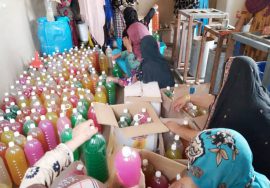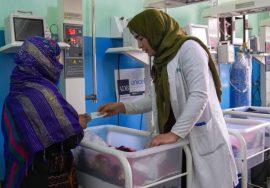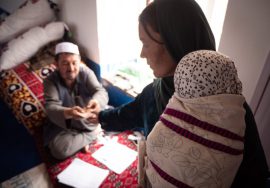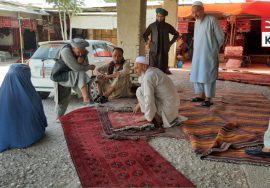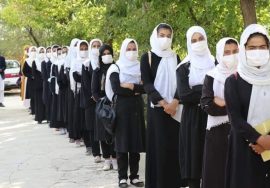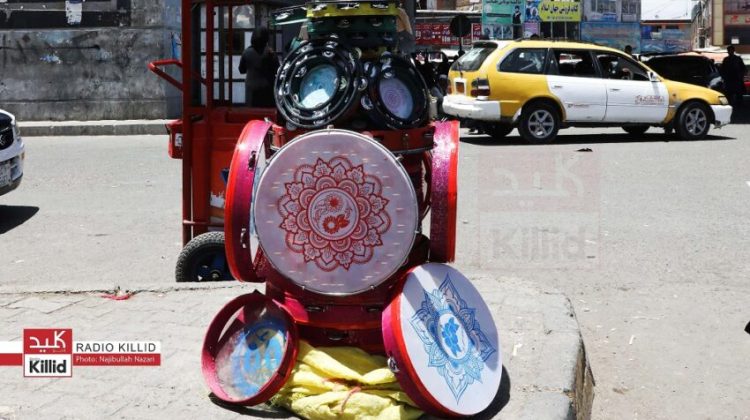
The Drum (Daf) Saleswoman Complains About the Stagnation of Her Work
Deljan, one of the women who sell Drum (Daf), says that her work decreased and the def buying interest has decreased.
They call on the Islamic Emirate to pay attention to their situation and say that the government should provide alternative work to needy women.
This is a drum (def) sound that is heard in the Kota-e Sangi market. By playing Drum (Daf), Deljan attracts the attention of customers to buy this musical instrument. Playing def is still common in Afghan wedding ceremonies, and sometimes women and young girls play def when children are born.
Deljan, who sells def near the Kota-e Sangi Bridge under the burning sun, complains about the decrease in her customers.
“It’s been three years that I’ve been busy selling def. In the past, our business was good, but now I leave home at ten in the morning till 4 or 5 in the evening. Sometimes I earn just 50 or 100 Afghanis and sometimes not at all.”
Deljan has eight children and has to provide food for them. She says that with the 50 or 100 Afghani she earns, her life cannot go on and there is no other work to provide food for his children.
“I live in a tent and I don’t have a house. Life is hard and I don’t have enough money to provide two meals for my children. If I find something to eat in the morning, we don’t have food for the night. I find one meal very difficult. Sometimes it happens that we have nothing to eat.”
Deljan’s ten-year-old daughter, Marzia, cooperates with her in selling def and helps her mother find bread by collecting plastic bottles.
“My mother told me to collect plastic bottles and sell them to buy liquid gas for the house.”
Life problems caused Marzia to not be able to go to school. She says in a sad voice: “I don’t go to school. I have to work and I don’t have money to study.”
I had not finished talking with Marzia and some ladies stopped to buy drums (Daf).
Sound Effect: (How much is this? 100 Afghani.)
When the customers left, Deljan said with tears in his eyes, “No one is buying a drum. People’s economic situation is bad and they have no money.”
At the same time, Deljan also complains about the police. She says that the police do not treat her properly and sometimes force her to leave the workplace.
“The police don’t allow me to sell drums in this place. They took the drums to the police station several times and told me not to sell the drum.”
This suffering lady says that if they are not allowed to sell drums (Daf) in the markets, the Islamic Emirate should provide alternative work to needy women.
“I ask the Islamic Emirate to build specific shops in a market for us to continue our work safely, or to provide us an alternative work for a better life.”
Meanwhile, officials of the Labor and Social Ministry say that they have a specific plan to support homeless women. Samiullah Ibrahimi, the head of this ministry’s information and communication department, says that such women have changed their jobs and benefited from the ministry’s plan.
“We have designed plans such as technical and professional training for poor and widow women, and some plans are being implemented. We are trying to eliminate unemployment in the country and we are trying to make our plans bigger.”
The representative of the Promotion of Virtue and Prohibition of Evil Ministry says that selling and playing the drum is not prohibited. Akif Muhajir, the spokesman of this ministry says that selling and playing the drum is allowed in Islam.
“About the drum, I must say that the Messenger of Allah (PBUH) said in a hadith that you should tell the people about marriage, even if it is with a drum. Also, one day, the Holy Prophet, (PBUH), was sitting and the girls were playing drum, when Abu-Bakr came, playing drum was not forbidden, but when Umar came, it was forbidden.”
It should be mentioned that the drum has a long history in Afghanistan, and since ancient times women and young girls played the drums (Daf) at happy parties such as weddings, eating sweets, and at the birth of children.


